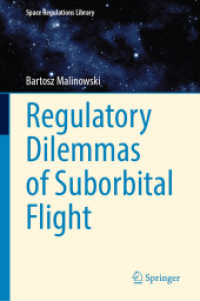- ホーム
- > 洋書
- > 英文書
- > Philosophy
Full Description
Performance-based epistemology conceives the normativity involved in epistemic evaluation as a special case of a pattern of evaluation that can be applied to any domain where there are agents that carry out performances with an aim. For example, it conceives believing and judging as types of performances with an epistemic aim that are carried out by persons. Evaluating beliefs epistemically becomes then a task with essentially the same structure that evaluating athletic, culinary or any other sort of performance; in all cases the performance in question is evaluated in terms of how it relates to certain relevant competences and abilities of the subject that carries it out. In this way, performance-based epistemology locates epistemic evaluation within a general normative pattern that spreads across many different human activities and disciplines. This volume presents new essays by leading epistemologists who discuss key issues concerning the foundations and applications of this approach to epistemology. The essays in Part I examine some foundational issues in the conceptual framework. They address questions central to the debate, including the compatibility of apt success with some forms of luck; the connection between aptness and a safety condition for knowledge; the fallibility of perceptual recognitional abilities; actual-world reliabilism and reliabilism about epistemic justification; the nature of the agency required to make a cognitive success truly one's own; the basic conceptual framework of performance-based epistemology. Part II explores Sosa's epistemology of a priori intuition; internalist objections to Sosa's views on second-order knowledge; the roles that epistemic agency is meant to play in performance-based epistemology; the value that second-order reflection may have; epistemic incompetence; and the problem of epistemic circularity and criticises Sosa's alternative solution.
Contents
I: FOUNDATIONAL ISSUES; II: APPLICATIONS AND PROBLEMS








